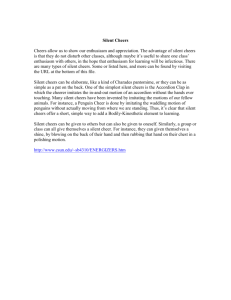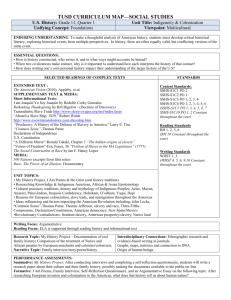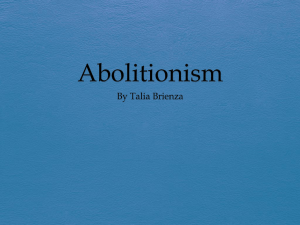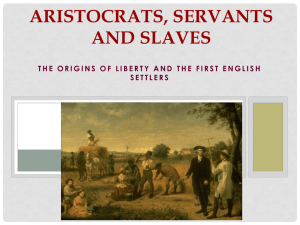(British) Speech at Faneuil Hall in Boston - 1851
advertisement
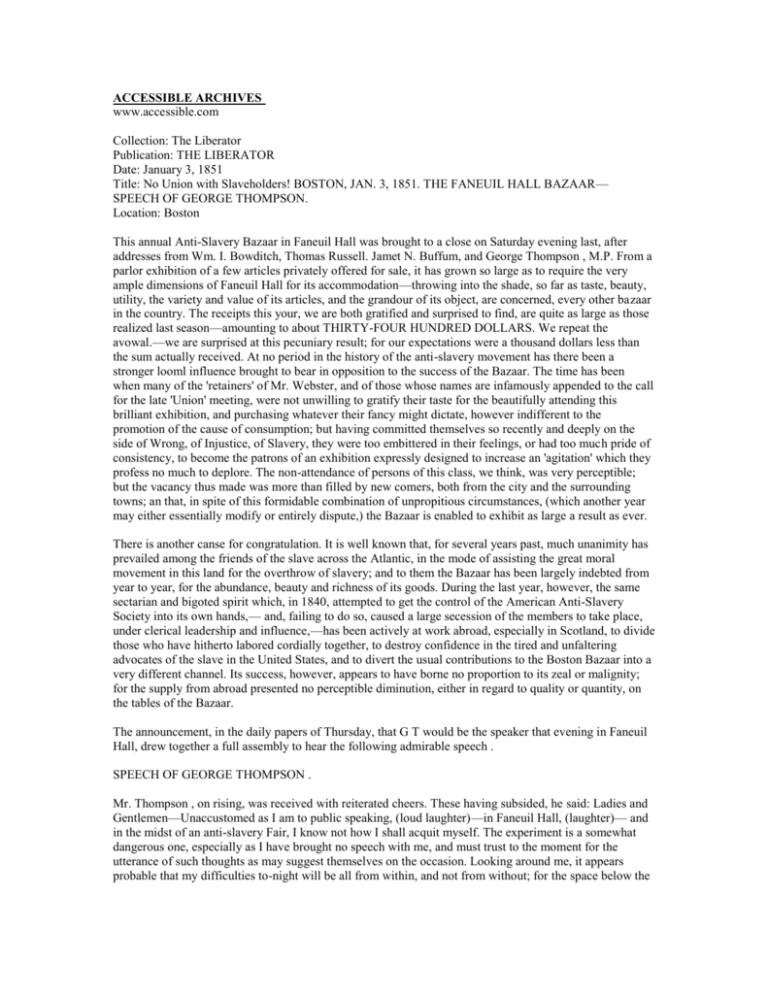
ACCESSIBLE ARCHIVES www.accessible.com Collection: The Liberator Publication: THE LIBERATOR Date: January 3, 1851 Title: No Union with Slaveholders! BOSTON, JAN. 3, 1851. THE FANEUIL HALL BAZAAR— SPEECH OF GEORGE THOMPSON. Location: Boston This annual Anti-Slavery Bazaar in Faneuil Hall was brought to a close on Saturday evening last, after addresses from Wm. I. Bowditch, Thomas Russell. Jamet N. Buffum, and George Thompson , M.P. From a parlor exhibition of a few articles privately offered for sale, it has grown so large as to require the very ample dimensions of Faneuil Hall for its accommodation—throwing into the shade, so far as taste, beauty, utility, the variety and value of its articles, and the grandour of its object, are concerned, every other bazaar in the country. The receipts this your, we are both gratified and surprised to find, are quite as large as those realized last season—amounting to about THIRTY-FOUR HUNDRED DOLLARS. We repeat the avowal.—we are surprised at this pecuniary result; for our expectations were a thousand dollars less than the sum actually received. At no period in the history of the anti-slavery movement has there been a stronger looml influence brought to bear in opposition to the success of the Bazaar. The time has been when many of the 'retainers' of Mr. Webster, and of those whose names are infamously appended to the call for the late 'Union' meeting, were not unwilling to gratify their taste for the beautifully attending this brilliant exhibition, and purchasing whatever their fancy might dictate, however indifferent to the promotion of the cause of consumption; but having committed themselves so recently and deeply on the side of Wrong, of Injustice, of Slavery, they were too embittered in their feelings, or had too much pride of consistency, to become the patrons of an exhibition expressly designed to increase an 'agitation' which they profess no much to deplore. The non-attendance of persons of this class, we think, was very perceptible; but the vacancy thus made was more than filled by new comers, both from the city and the surrounding towns; an that, in spite of this formidable combination of unpropitious circumstances, (which another year may either essentially modify or entirely dispute,) the Bazaar is enabled to exhibit as large a result as ever. There is another canse for congratulation. It is well known that, for several years past, much unanimity has prevailed among the friends of the slave across the Atlantic, in the mode of assisting the great moral movement in this land for the overthrow of slavery; and to them the Bazaar has been largely indebted from year to year, for the abundance, beauty and richness of its goods. During the last year, however, the same sectarian and bigoted spirit which, in 1840, attempted to get the control of the American Anti-Slavery Society into its own hands,— and, failing to do so, caused a large secession of the members to take place, under clerical leadership and influence,—has been actively at work abroad, especially in Scotland, to divide those who have hitherto labored cordially together, to destroy confidence in the tired and unfaltering advocates of the slave in the United States, and to divert the usual contributions to the Boston Bazaar into a very different channel. Its success, however, appears to have borne no proportion to its zeal or malignity; for the supply from abroad presented no perceptible diminution, either in regard to quality or quantity, on the tables of the Bazaar. The announcement, in the daily papers of Thursday, that G T would be the speaker that evening in Faneuil Hall, drew together a full assembly to hear the following admirable speech . SPEECH OF GEORGE THOMPSON . Mr. Thompson , on rising, was received with reiterated cheers. These having subsided, he said: Ladies and Gentlemen—Unaccustomed as I am to public speaking, (loud laughter)—in Faneuil Hall, (laughter)— and in the midst of an anti-slavery Fair, I know not how I shall acquit myself. The experiment is a somewhat dangerous one, especially as I have brought no speech with me, and must trust to the moment for the utterance of such thoughts as may suggest themselves on the occasion. Looking around me, it appears probable that my difficulties to-night will be all from within, and not from without; for the space below the chandelier is very differently occupied now than when I last had the honor of standing on this spot. (Cheers.) Ladies and gentlemen, I believe I am the only contraband miracle in this hall. (Laughter.) Every thing else is legitimate, according to the tariff of the United States; but a foreign abolitionist is a prohibited commodity in Boston . (Loud laughter.) We read in the sacred scriptors, that when our Savior was upon earth, a certain community prayed him that he would depart out of their const. I have heard learned divines say, it was because he suffered the devils to enter into the swine, who all ran violently down a sleep hill into the sen, and were drowned; proving the truth of the saying, that the devil always drives his pigs to a bad market. (Loud laughter.) Perhaps it is for some such reason that the American pro-slavery community desire to get rid of me. Their dislike to me, I fully believe, does not originate in the inset of my being a foreigner; but because that, like the Gadarenes of old, they think their unholy traffic in slaves is in danger. (Great cheering.) Nothing is disliked here simply because it is foreign. Why! if every thing I see around me in this city, that is of foreign origin, or foreign material , were to take to itself wings and flee away, you might almost advertise, 'Boston to let, unfurnished.' No, no, it is not the foreigner that is hated, it is his doctrine; and were an angel straight from the throne of God to bring that doctrine here, there are those in Boston , and in every other part of this Union, who would mob the heavenly messenger as they have done me. (Cheers.) Ladies and gentlemen, a man in my situation tonight ought to be able to make a good speech . The place, the cause, the circumstances, the audience, and all the adjuncts of the meeting, ought to inspire him. What are these inanimate objects around me? They are tokens of remembrance from a far-off country, and that country is my home. Here is something to remind me of romance Scotland—its hills, its glens, its streams, and, nobler far, its women, who have not forgotten the claims of three millions of slaves in this country. Here is something to bring before me the the Emerald Isle, and the zeal of the women of Dublin, and Cork, and Belfast, in the cause of human redemption from chattel bondage. Here, too, are many things to remind me of dear England, and of those her daughters, who never wearied in their work of merey, until they had set free eight hundred thousand slaves in the colonial possessions of Great Britain. Every article on these tables beneath me, however insignificant its intrime value, hath a tongue, which speaks, not alone of present sympathy, but of past success in this most holy cause. These offerings are the emblems of a great victory in the cause of the negro: they say to all here— Be ye also faithful and unwearied in this labor of love, and you, like us, shall realize your reward, in the ultimate triumph of your cause.' (Loud cheers.) Are there those who affect to sneer at woman's toils in this gigantic enterprise? I tell them they have much greater reason to tremble than to scorn. It is not in the power of all the floods of Southern rage, swelled by all the tributary streams of Northern subserviency and sycophancy, to quench the flame of woman's odor in this work of faith. The daughters of the pilgrim fathers are not behind their sisters in Great Britain; and they forced a British minister of the Crown to declare, that they had spoken with a voice he could neither despise nor resist. reelst. (Cheers.) For twenty years I have watched the progress of this cause, and stand here to smart my conviction. that the work of emancipation in America, when achieved, will be icon owing to statesmen, politicians and priests, than to women. (Cheers.) They have enlisted in this holy war, and they will not desert. By night and by day, in reproach and in renown, in peril and in prise, in gloom an d in glory, they will remain steadfast and unflinching, until the now diseased and corrupted state of public sentiment is changed, and our sex has caught the holy contagion of their principles and purposes. (Great cheering.) Liberal as have been the contribution of my countrywomen to this Fair, I feel assured they would have been much larger, but for the base and cruel arts of intolerant pro-slavery clergy of this country. I know full well; that every stratagem which bigotry and malice could suggest, has been resorted to, to poison the minds and paralyze the energies of the people of England, —the women in particular, —against the cause of the slave here. [Cheers.] I do not scruple to proclaim it here in Boston , that a visit to our shores of one of your proslavery clergy is a calamity [Cheers] I pray that, until America shall cease to deny the Christian religion by holding the negro in bonds, no more of your negro-hating elergymen will go to Great Britain. [Loud cheers.] An anti-abolitionist American minister of religion is a moral pestilence in England. [Great applause.] His office and rank obtain for him admission into the society of the benevolent and the good; and the return he makes for the hospitality shown to him is, to misrepresent and malign the self-sacrificing friends, of the oppressed in this country. These wicked proceedings have been particularly successful; but thank God! this Hall contains the evidence that there are those who have been proof against the drawingroom whisperings of these calumniators. [Lour cheers.] Should I live to return, I will not fail to do my best to supply the antidote to these falsehoods. The people of England shall know where these backbiters stand when at home, and full justice shall be done, both to them, and to those they have sought to injure. [Great cheering.] Let me offer one remark in passing. Nothing can be done in this cause without the most inflexible adherence to principle. There must be no compromise. For twenty years, there was a society in England for the mitigation and gradual abolition of colonial slavery. It was a highly respectable association. It had a member of the royal family. —the late Duke of Gloucester, —for its patron. Mr. Wilberforce was its President. On its committee were Clarkson, and Brougham, and Stephen, and Macaulay, and denman, and Lushington, and a host of other illustrious names. At the end of twenty years of effort in the cause of mitigation, the horrors of slavery were greater than ever, and the only prospect of a gradual abolition was through the entire immolation of the negro population, who were diminishing under the wasting influence of the infernal system. At length, a few fanatics resolved to demand immediate emancipation, as the duty of the master, and the right of the slave. (Cheers.) I had the honor to be one of those sent forth to preach this doctrine. Throughout the breadth of the country, I proclaimed that slaveholding was man-stealing, and that slavery was SIN, under all existing, or supposible, or possible circumstances, and could not but be sin; since for man to claim property in man was to usurp the authority of the Eternal Ruler of the Universe, and by dethroning Jehovah, to be guilty of practical Atheism of the blackest kind. I prenched that slavery was the crime of crimes, and ought therefore to be instantly, unconditionally, totally and forever abolished. (Loud cheers.) God gave his blessing to the preaching of this doctrine—the great heart of England responded—an electric shock wend through the land, and the lighting of British indignation smote the guilty system to its utter fall and perpetual ruin. (Cheers.) I declare the same doctrine here in Faneuil Hull. (Cheers.) I ask not the permission of Mr. President Millard Fillmore or Mr. Secretary Daniel Webster to preach it, for I have the command of the ever living God, who laid the foundations of the Rocky Mountains, to declare it throughout all the realme over which his septre extends. (Loud cheering.) Am I told I am a foreigner? I look upwards, and I say, there sits your Sovereign as well as mine, and he says, 'Let the oppressed go free.' (Cheers.) Am I pointed to Mason and Dixon's line, and to the compromise of the Constitution ? I answer , 'I see no such lines on the map of God's dominions. I see no such compromise in the imperishable Constitution which God has promulgated for the moral government of the world.' (Renewed applause.) I will not insult my Maker so much as to ask of any human being permission to vindicate the authority of the Most High, or to denounce so outrageous a crime as that of American slavery. On whatever spot of earth I stand, I will denounce robbery as robbery, tyranny as tyranny, atheism as atheism—boundaries, constitutions, laws, compromises, to the country not withstanding. What have I to do with these ? Let those look after them that made them. [Loud applause.] O, who can insult his country, when he tells me that I may preach liberty all over the world but here! (Cheers.) Talk of my abusing the institutions of America! Why, the worst things ever said in the old world against your nation are compliments compared with what your newspapers say of you every morning. They tell you that the cohesion of these mighty common wealths, from Maine to California—the stability of this glorious and matchless Union—the very existence of the freest and most powerful government that ever existed on the face of the earth, depends upon your driving from your doors, at midnight, in a New England winter the trembling, shivering fugitive who asks, in the name of Christ, to be permitted ti thaw his frozen limbs at your fireside, and to lay down his weared body on your hardest couch. (Rapturous cheers.) Did the vilest panderer to despotism ever invent a libel a millionth part so severe —a sarcasm a millionth part so searching—or utter a truth a millionth part so withering and blasting as that which you are compelled to read every time you take up one of your newspaper? Yet such is the fact; you know it to your shame and humiliation. You might have allowed your enemies to rail on, and have despised their calumnies, had you been true to your own principles; but your have rendered it utterly impossible for the most virulent and malignant hater of America to say any thing so hard of you as that which Mr. Webster utters whenever he gets up to make a Union speech , or to defend the Constitution. (Cheers.) Ladies and gentlemen—While I cannot but regard all who defend slavery as conspirators against liberty. and the more guilty if they profess republican politics, I must confess that there is one class of your community which I regard with unutterable loathing and whose conduct fills me with a feeling of indignation that I cannot restrain, but cannot adequately express;—that class is thee pro-slavery elergy of the country generally, and the pro-slavery elergy of your city in particular. When I was here, fifteen years ago, your clergy held that the topic of slavery was unsuitable for the pulpit. They were all opposed to slavery, but to read an anti-Slavery notice, or make an anti-slavery prayer, or give their churches for antislavery meetings-still more, to preach anti-slavery sermons—would be to introduce an extraneous subject—one quite foreign from the uses of the building, and the functions of the minister of religion. On returning here , I find things, with a few noble exceptions, in the same state. But mark the consistency of these men. The Sharps and Rogerses, who are so jealous of the sanctity of their pulpits that they will on no account allow them to be decraed by the delivery of an anti-slavery dissourse, so sooner hear that the President has signed a law requiring the citizens of Massachusetts to return fugitive slaves, than tarning their back on Meant Sinal, and bowing their hands in the direction of Washington—Singing humanity and hospitality behind their backs—they preech sermons enjoining upon their neighbors the doing of that which Henry Clay would scorn to do. Yes these reverend gentlemen lean over their fashioned desks sad discourse to their flocks upon the beauties of kidnapping and slave-catching. (Loud cheers). I have compelled myself to read Dr. Sharp's sermon, from the text, 'Put them in mind to be ready to every good work.' And what is this ' good work '! It is the good work of catching Christ, in the person of a panting, palpitating slave, and sending him back to the pandemonium of slavery. O, the forbearance of God, that suffers such men to profane his holy name, and blaspheme his pure and infinitely benevolent religion! (Cheers.) The Jews had a City of Refuge for the guilty, blood-stained homicide, but this Reverend Christian Dr. Sharp would have fugitive negro, who has swam rivers, scaled mountains, waded through swamps, uncounted wild beasts, braved and escaped the bowie knife and the rifle, and has gained at last the city of Boston , dragged hence, and hurled back to slavery, to be tortured for his manhood—to be scourged for his intrepidity—and sold to the far South, as a punishment for throwing himself upon the generosity of the North! And this with his hand upon the Bible, he tells his congregation, is 'putting them in mind to be ready to every good work.' He talks of slavery as an abstraction, in terms of regret and disapprobation, but he says, when he comes to speak of men-stealers, 'In what I say, I would have it understood , that I discriminate between slavery and multitudes of EXCELLENT PERSONS who are the holders of slaves. Excellent persons! What son of a pilgrim sire would not obey such excellent persons rather than God! who could think of disobliging them, when they only ask you to do that, for which when Judas had done it, he went out and hanged himself? Dr. Sharp expresses a sort of rosewater, sorrow that such a clause should be in the Constitution as that which requires the return of the fugitive slave. He says, 'I regret its existence, but there it is. How very composed! 'There it is' And then, to cap the climax, he says, 'This country is the New Carman, the Land of Promise: but it will be a Cannan no longer than the laws are obeyed. R OR W!' These are his very words. The boldest blasphemer that ever desired the Omnipotent to do his worst could utter nothing more immoral or more traitorous against the authority of God. And this man is an Englishman. Thank God, he does not pollute English eara with such during impiety! (Loud applause.) Dr. Sharp has a worthy coadjutor in the Rev. Mr. Rogers. (another recreant Englishman,) who tells his congregation that the morality which teaches that it is 'sinful' to obey an unrighteous law, is an 'infidel Christianity,' and that 'when counsel is asked of God, he gives no such answer.' And these men are 'foreigners;' but are they mobbed in Boston ; No. Does state street hire a dissolute horde to break into their meeting-houses and prevent them from being heard? No. Do the newspapers of Boston denounce them? On the contrary, they allow them to publish their sermons, from their own manuscripts, in their colums, and strike off 'Extras,' to give them additional dissemination. Among all the living spectacles of human inconsistency and national depravity and guilty, there is not one so glaring as that which is exhibited by the United States at the present moment. It was once my fate to see a hunt in England. There was a pack of wide-mounted, hungry hounds; some fifty or sixty red-coated men, mounted on fleet steeds as may more in various costumes, on cattle of all qualities; and the horses, hounds and men were all in pursuit— over hedge and ditch, hill and dale—of a poor flying deer, whom they hoped to come up with and destroy. I thought it the most absurd, ridiculous, and at the same time cruel sport I had ever witnessed. But what do I behold here ! Yonder is a woman pressing her infant to he bosom, and flying from slavery. She cannot endure the thought that her little one should suffer the horrors of that demoniacal system which has cursed this country, She is pursued. She has escaped the fangs of the trained bloodhound, and has reached the soil of what is called a F State (hat mockery of the word!) but , is she safe? No. Her real perils have just begun. In the slave State, she had but to elude the overseer of the plantation and the negro-catcher and his dogs: but now, a very different pack is at her heels. Bostonian Americans! behold the chase! There flies one of God's and American's children, hunted for more than life. Who are those who are yelling upon her track? They are United States Commissioner ; United States Marshals ; United States Judges United States Militia ; a United States Secretary of State , in the person of the 'godlike 'Daniel Webster' United States Lawyers in the persons of the Choates, and Curtiacs, and Halletts of your own Bar; United States Troops and the United States Nary ! And who is the grand huntsman, to cheer on and direct the movements of the pack? He is Millard Fillmore, the President of this glorious Republic: who threatens with fine and imprisonment all who dare to give a cup of cold water to the panting sinking wretch, or who allows her to shelter herself for an hour in his stable or his barn. Bringing up the rear are the Cherry of the United States; and Dr. Sharp's voice is heard among them, saying of the agonized mother and her child, (I quote his very words,) 'they are only known as property , not as human beings having the rights or laws of free persons.' Turn out, then, citizens of Boston , says the Doctor, and join the hurt; for it is my duty to put you in mind to be ready to EVERY GOOD WORK.'The voice of the Rev. Mr. Rogers, too, is heard, saying—'If you think it sinful or even sarong to return the fugitive your Christianity is an infidel Christianity and you have not taken counsel of God.' Dr. Orville Dewey, too, is heard, proclaiming —(I quote from the reverend gentleman's words, as reported into the Boston papers)—'If we do not return the fugitive, there is AN END to slavery , an end to peace , an end to the Union '! Say not that I have been guilty of misrepresentation. I have cited correctly the words uttered by American divines in your own city; and I will also give you the words of your own Chief Magistrate, in his letter to Mr. Collins, the person wo claimed Ellen and William Crafts. Hear the President of these United States: 'Whenever the laws of the United States shall be Opposed, or the execution thereof shall be abstracted, in any State by combination too powerful to be suppressed by the ordinary course of judicial proceedings or by powers vested in civil officers, it will be his duty to call forth the M, and use the A and N for the purpose of overcoming such forcible combinations against the laws.' And is it to America to spit at Kings, and denounce Emperors, and abuse every Government that is not republican in its form? I am told of the love of liberty that regions in the heart of every American. Who ever doubted that the American loved liberty? Who does not love it? There is not a man now confined in Leverett street jail, who does not love liberty. and who would not joyfully regain it, if he could. 'O, where's the slave so lowly, Condemned to chains unholy, Who, could he burst his bonds at first, Would pine beneath them slowly?" It is peculiarly the merit of a citizen of these States to love liberty? Is there any noble virtue in the love of liberty? Satan loved it when he fell down from Heaven. The virtue consists in giving it to others, not in loving it for ourselves. (Prolonged cheers) But what shall we may of those who talk of their own loves of liberty so boantingly, and are constantly building the world that. 'Tis Liberty alone that gives the flower Of fleeting life its lustre and perfume,' and are at the same time the most rushless of all slave holders on the face of the globe? (Great applause.) Judging of the value of liberty by the American's own estimate of it, what is the measure of his guilt, when he conspires with others to rub three millions os his equals of the precious gift: (Cheers) I tell him from the rostrum of Old Fanuil Hall, that he is the baste despot that was ever permitted to poison God's free air with the breath of his hypocritical eulogies upon the value and blessings of freedom. I would tell Daniel Webster so, if he were here, and challenge him to show by what right a single negro is held in chains upon this soil. (Prolonged cheers.) Am I told that the Constitution sanctions the system, and therefore it is holy, and just, and right? Why, then, all I can say is, that the Consitution is an inscrutable curse. Then is chattel slavery, held in all the world besides to be an institution founded and upheld by robber-right,— alone made legal, sacred and perpetual, by the Constitution of a people, that call themselves the freest community on the earth. God save mankind from a second calamity of the same sort! and God give strength to his servants, to brand such a Constitution as the greatest outrage ever committed against the laws of Heaven, or the liberties of our race!(Cheers.) My friends, I hear it said that the agitation against slavery must and shall be put down; and that there is a counter agitation going on for that purpose. I know not what to think of the men, who, knowing the stuff of which New England souls are made, tell their brethren of the South, what they must be convinced is sheer moonshine. (Cheers.) Crush the spirit of Anti-Slavery! Who ever heard of such a thing before? No, Mr.Webster; no man knows, better than yourself, that you might as well attempt to catch the first rays of the morning: or bind the powers of electricity and the sweet influences of the Pleiades; or loose the bandsw of Orion; or prevent the needle from pointing to the North pole: or any other impossible thing, as to put down Anti-Slavery. (Cheers.) You may catch a slave, or crush an abolitionalist. You may imprison a C, or murder a Lovejoy, but you have not conquered the idea ; not will all the troops and clergymen you can summon to your aid enable you to arrest, still less to bind in chains, the idea which has taken possession of the souls of these women around me, whom, in your pride of place, you affect to deride. Mr.Webster! you know this, and you have said it. I appeal from Webster at Washington, in 1850, to Webster in Niblo's Saloon in 1837 — from Webster, the Compromiser, to Webster when he declared himself free to speak on this subject, with out the caution of a diplomatist, and without the ambiguity of 'an inaugural'. You understood the anti- slavery movement then, and you made your audiences understand it. You told the world, thirteen years and more ago, that it was not a question of politics; but one that had struck a far deeper chord— even the religious feeling of the country. You supposed a man foolish and insane enough to trifte with or despies that feeling; and you described him as a rash man, little conversant with human nature, who had formed a very erroneous estimate of the people of this country. You then declared that 'to attempt to coerce this feeling into silence, or to endeavor to restrain its free expression, would be indeed to endager the safety of the Constitution, and of the Union itself.'m There spoke the philosopher, the Statesman, and the Patriot. There spoke Mr.Webster, standing the Cradle of the Anti-Slavery Hercules. Does he think that, after thirteen years of growth, and exercise, and experience, and wisdom, this child of the storm and the whirlwind can be trifled with and despised with more impunity than when in its swaddling clothes? Mr.Webster at the expense of your heart, we must hold your intellect guiltless of such folly. We will draw strength, and hope, and confidence from the words you uttered when at your best estate. We will take your portait of Abolitionist drawn at a time when no Southern man was permitted to mix the colors, and when no President Chair terminated the vista down which your eye wandered. My friends, I perceive that a grand combination is being formed against you, under pretence of preserving the Union. I know not how this Union movement strikes you; but to me, as a looker on, it appears a very shallow artifice to put down abolition, and secure Southern support to some particular Northern political project. Be that as it may, I cannot see the special danger to to which the Union is exposed, if the abolitionists be deserving of the contempt with which certain distinguished statesman profess to treat them. How they can, at one and the same time, be a miscrable, small, uninfluence knot of deluded or traitorous men and women, and a body whose numbers and power mensace the of your federation, I know not. I shall not presume to speculate upon this topic, but will take the liberty of mentioning a very interesting letter, which I have lately read in the public prints, addressed by Mr.Joel R. Poinsett to the citizens of South Carolina. I suppose it is intended as a set off to a disunion message from the pen of the Governor of the Palmetto State. In this letter, Mr.Pomsett says: 'We are told that the remedy for the these evils is to be sought for in revolution— for what is secession but revolution? It is true, that if Virgns, North Carolina,Tennessen, South Carolina, George , Alabama, Louisiana, Florida, Mississippi and Texas were to form a Confederacy, and agree to secede, there might be no opposition for a time. But many of those States form but the entrance and portico to the great edifice reared in the West. How long would the inhabitants of that mighty structure endure the privations they must suffer, if their ingress and egress were in the hands of foreigners? Would they permit Louisiana to be the ally of some maritime powers that might occupy New Orleans, and harass the internal commerce of the Mississippi valley? I think not. No line can be drawn that will not involve questions of Boundary and right only to be settled by the miserable aspect of the Spanish American States. Besides, such a Confederacy would present no barrier against the attacks of the aboliionists of all the world. The sympathies of civil Europe are against our institutions, and if they be not protected by the Constitution and the much despired Union, our slaves would not be worth ten years' purchase.' 'Under the lead of South Carolina, such a Confederacy will never be created. We are unfortunately not renowned for our wisdom or prodence, and our invitations and our taunts will be alike in vain to drive our sister States into measures of violence for the past— what the future may bring forth, time will show.' 'If there are any among us so wild as to think of separate State action, to them I would say, that they mistake violence for strength. Let them examine the map and consult the census, and they will see our relative weakness, and understand with what case South Carolina might be prevented from inflicting any injury, expect upon herself. But I will not pursue this humiliating theme; it is improbable that such a measure will be resorted to It would be as absurd as for one to throw himself from a precipice in the expectation of injuring his enemy in the fall. I shall offer no comments upon these opinions, which speak for themselves. They are the views of one who knows the strength and resources of the Southern States, and are well worthy of consideration. I have in these remarks spoken plainly, but with every desire for the true welfare of this great country. May the abomination I have condemned be soon extirpate! Then shall peace go hand in hand with freedom, and the exhaustible energies of this mighty people be devoted, not only to the maintenances of their own independence, but also to the advancement of liberty throughout the world. Mr.Thompson resumed his seat amidst the loudest cheers.


